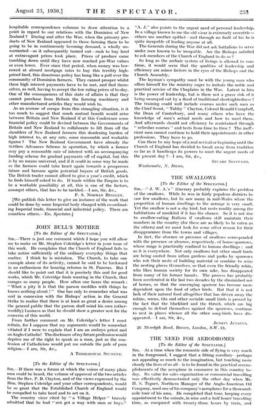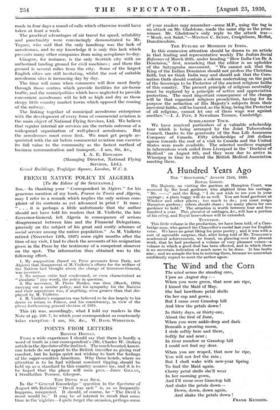THE NEED FOR AERODROMES
[To the Editor of the SPECTATOR.]
Sin,— At a time when the romantic side of flying is very much in the foreground, I suggest that a fitting corollary—perhaps not appealing so much to the imagination, but touching more closely the lives of us all—is to be found in the practical accom- plishments of the aeroplane in commerce in this country to- day. Its value for sales organization or commercial travelling was effectively demonstrated only the other day when Mr. II. S. Tegner, Northern Manager of the Anglo-American Oil Company, used one of his company's aeroplanes for a thousand. mile tour of his area. He completed that tour, keeping every appointment to the minute, in nine and a half hours' travelling time, as compared with twenty-three hours by train. and made in four days a round of calls which otherwise would have taken at least a week.
The practical advantages of air travel for speed, reliability and punctuality were convincingly demonstrated to Mr. Tegner, who said that the only handicap was the lack of aerodromes, and to my knowledge it is only this lack which prevents many other companies from using aeroplanes to-day.
Glasgow, for instance, is the only Scottish city with an authorized landing ground for civil machines ; and there the ground is several miles from the city. Some of the largest English cities arc still hesitating, whilst the cost of suitable aerodrome sites is increasing day by day.
The time will come when commerce will flow most freely through those centres which provide facilities for air-borne traffic, and the municipalities which have neglected to provide convenient aerodromes will be left as high and dry as those sleepy little country market towns which opposed the coining of the railway.
The linking together of municipal aerodrome enterprises with the development of every form of commercial aviation is the main object of National Flying Services, Ltd. We believe that regular internal air services are the certain outcome of a widespread organization of well-placed aerodromes. But the aerodromes must come first. We must get people ac- quainted with the air before commercial aviation can exercise its full value to the community as the fastest method of business communication and transport.—I am, Sir, &c.,
I. A. E. EDWARDS (Managing Director, National Flying Services, Ltd.).
Grand Buildings, Trafalgar Square, London, WA'. 2.

































 Previous page
Previous page